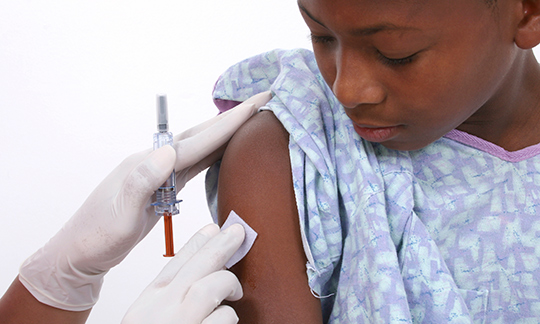Influenza season 2016 is here
The Influenza season is in its beginning stage. This usually takes place in South Africa between the last week of April and the first week of July. The Western Cape Department of Health has started providing vaccinations to mitigate the effect of influenza. 
Vaccines will be available during this flu season and the department will ensure that it's utilised in accordance with the national campaign.
The Western Cape Government of Health has received a 100 000 doses of influenza vaccines to be distributed to all public facilities around the province.
Influenza Vaccination Programme
The Department’s Influenza Vaccination Programme targets the following high risk individuals that present to our public health facilities:
a) Adults and children at high risk for flu-related complications because of underlying medical conditions including:
- Chronic pulmonary disease (including asthma).
- Cardiovascular disease (except hypertension).
- Renal, hepatic, neurological and haematological disorders.
- Metabolic disorders (including diabetes mellitus).
- Morbid obesity (Body mass index (BMI)≥40).
- Immunosuppression (including HIV-infected persons with CD4 counts over 100/mm3.
b) Pregnant women (all stages of pregnancy).
c) Children aged 6 months to under 5 years (59 months).
d) Residents of old-age (nursing) homes and other chronic care or rehabilitation centres.
e) Children aged 6 months to 18 years on long-term aspirin therapy.
f) All persons aged 65 years and older. 
The Western Cape Minister of Health, Dr Nomafrench Mbombo encourages the high risk individuals and vulnerable groups to access these vaccines at the local health facility.
"Part of our vision for Healthcare 2030 is to increase wellness amongst society and this vaccination campaign forms part of our strategy to boost people's immune systems, so that their bodies are less vulnerable to disease. By receiving these vaccines these individuals are healthy and strong and able to go to work every day and live the life they value. 'Flu' vaccinations are only steps on that road, but building blocks towards a healthier society. So make use of this opportunity that our health services offer so that we can be better together," says Minister Mbombo.
As usual, surveillance programmes run by the National Institute for Communicable Diseases (NICD) have detected sporadic cases. In the first nine weeks of 2016, 39 specimens have been received from Viral Watch sites of which 3 yielded evidence of influenza.
Vaccination is the most effective strategy to prevent influenza.
The influenza vaccine could be accessed at public health sector clinics and private healthcare providers (pharmacies and private practitioners etc.).
Frequently asked questions
1) How do you get flu?
 The flu virus spread mainly by droplets made when people with flu cough, sneeze or talk. These droplets can land in the mouths or noses of people who are close by. You can also catch flu by touching a surface or an object that has flu virus on it and then touching your mouth, eyes or nose.
The flu virus spread mainly by droplets made when people with flu cough, sneeze or talk. These droplets can land in the mouths or noses of people who are close by. You can also catch flu by touching a surface or an object that has flu virus on it and then touching your mouth, eyes or nose.
2) What are the signs and symptoms of influenza?
- Sudden onset of fever.
- Acute upper respiratory symptoms: dry cough, sore throat.
- General symptoms: general discomfort, headache, fatigue, muscle pain and body aches, cold shivers and hot sweats.
- Some people may have vomiting and diarrhoea, though this is more common in children than adults.
3) Who is at risk of developing complications?
- Pregnant women, and including the 2 week period after delivery.
- Young children (< 2 years old).
- Elderly people (> 65 years of age).
- People with existing chronic diseases (heart, lung, kidney, endocrine) for example diabetes or asthma, persons who are immunosuppressed.
- Morbidly obese people (BMI ≥40 or BMI ≥35 with obesity related health conditions).
- People ≤18 years of age receiving chronic aspirin therapy.


